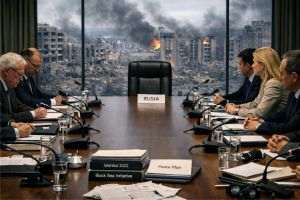The death of far-right activist Charlie Kirk has triggered a wave of heated reactions on social networks, but also a chain of harsh sanctions against those who commented critically on the incident. From teachers and firefighters to journalists and Pentagon employees, dozens of people have lost their jobs or been investigated for their opinions expressed online, reports The Guardian. The situation raises serious questions about the limits of freedom of expression in America, especially in a polarized political climate.
• Chain firings after online comments
According to reports in the American press, several people have been fired, suspended or censored for their comments related to Kirk's death. Among those targeted were teachers, firefighters, local politicians, journalists, but also an employee of the Secret Service and one of the Carolina Panthers American football team. Although the Trump administration has consistently presented itself as a defender of free speech, official reactions and measures adopted seem to contradict this position.
• Pentagon moves to strict checks
Pete Hegseth, the secretary of defense, has asked staff to identify military or civilian employees of the Pentagon who mocked Kirk's death. According to NBC News, several members of the military have already been relieved of their duties, and "dozens" of other employees have been investigated and punished. Thus, the reactions in the online environment have become the reason for internal purges, with direct implications for the careers of some people who, in many cases, published comments on personal accounts.
• Tense atmosphere in schools
Another sensitive front is the education system. In Florida, the state board of education explicitly warned teachers not to post opinions that could "undermine the trust of students and families." Two teachers have already been suspended: an elementary school teacher who made tongue-in-cheek comments about the incident and a high school counselor who linked Kirk's death to his controversial statements about guns. The cases have sparked heated debates about the role of education and the limits of teachers' personal expression outside the classroom.
• Journalists and media personnel among the victims
The most high-profile dismissal was that of Matthew Dowd, a political analyst at MSNBC, who was fired after suggesting that Kirk's radical rhetoric may have contributed to his own death. His statement was labeled "unacceptable," although Dowd later explained that it was misinterpreted and taken out of context. A reporter covering the Phoenix Suns basketball team and a communications coordinator for the Carolina Panthers also lost their jobs for comments deemed insensitive, US media reported.
• Online Hunt: Blacklists and Public Expositions
Activists Laura Loomer and Scott Presler, prominent figures on the far-right, have launched campaigns to publicly expose those who "rejoice” over Kirk's death. Teachers and other employees have been named on social media, along with their workplaces, in posts that have drawn public pressure on their employers. This "digital justice” is exacerbating tensions and raising the issue of the use of social media as a tool for stigmatization and intimidation.
• Freedom of Speech, Between Principles and Sanctions
While the Trump administration promises to crack down on "outsiders” who mock the activist's death, many Americans are already facing severe repercussions for their opinions expressed online. The Kirk case illustrates the tension between the right to free speech and the social and professional sanctions that stem from public comment. For some, these measures are necessary to combat hate speech; for others, they pose a direct threat to American democracy.
• A Nation Divided
The episode shows a deeply divided America, where even the death of an activist becomes a battlefield for ideological confrontation. While some view Kirk as a "martyr for free speech,” others see him as the symbol of radical discourse that has fueled hatred and polarization. In the absence of consensus, every online comment risks becoming a test of political loyalty-and free speech, although guaranteed by the Constitution, seems to be paying the highest price.


















































